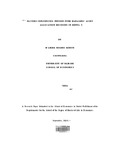| dc.description.abstract | Using a panel data regression approach this study analyses the significance of four factors that influence asset allocation decisions of pension fund managers in Kenya. It also isolates the asset class specific features that are important in influencing the share of pensions' assets that are invested in a particular asset class. The study analyzed the global asset allocation behavior of pension fund managers regulated by the RBA in Kenya over the period 2001 to 2007. The managers had a finite set of investment options namely, government securities, bank deposits, equity or shares, corporate debt, international assets, property, guaranteed funds and other assets.
A panel data approach was most appropriate as it solved the problem of a short time series in addition to being able to identify the individual class effects in asset allocation. GOP growth, inflation, asset returns and legislation had been identified as explanatory variable in the study, on the basis of first principles from literature. An additional factor was added at the analysis point, where it was realized that the previous period asset allocation was a strong influence to subsequent allocations. All the factors were found to have a positive relationship with allocation.
The study found that historical asset allocation was a significant factor influencing allocation. Legislation and asset returns were also found to be significant factors influencing pension fund managers' investment decisions in Kenya. The study found that legislation as structured was a significant factor influencing fund managers' decisions. The impact on asset allocation was however minimal. As such, it concludes that the current regulatory regime is appropriate for the industry as it appears to be guiding diversification, and there is minimal difficulty of compliance. Government securities, equities, bank deposits and guaranteed funds were found to have positive individual effects. Corporate debt, property and 'other assets' had negative effects. The study recommends further work to unearth the reasons behind the negative individual effects that were observed in the above classes. | en_US |

